Entrepreneurship Report: Ventures, Skills, and Social Economic Impact
VerifiedAdded on 2023/01/10
|11
|2585
|32
Report
AI Summary
This report provides a comprehensive overview of entrepreneurship, encompassing various ventures, typologies, and their impact on the economy, particularly in the United Kingdom. It delves into the similarities and differences between entrepreneurial ventures, analyzing the role of micro and small businesses in economic growth, employment generation, and contribution to the gross domestic product. The report explores the characteristics, traits, and skills of successful entrepreneurs, differentiating them from business managers. It examines the influence of entrepreneurial personality on motivation and mindset, and the factors in entrepreneurs' backgrounds and experiences that can either hinder or foster success. The analysis includes real-world examples like MOMA food, SGS products, Virgin Group, and Facebook, as well as discussions on the importance of innovation, social enterprises, and the impact of culture, poverty, and family wealth on entrepreneurial endeavors. The report concludes by highlighting the significance of small and micro businesses in driving social economy and providing employment opportunities.

Entrepreneurship and
Small Business
Management
Small Business
Management
Paraphrase This Document
Need a fresh take? Get an instant paraphrase of this document with our AI Paraphraser
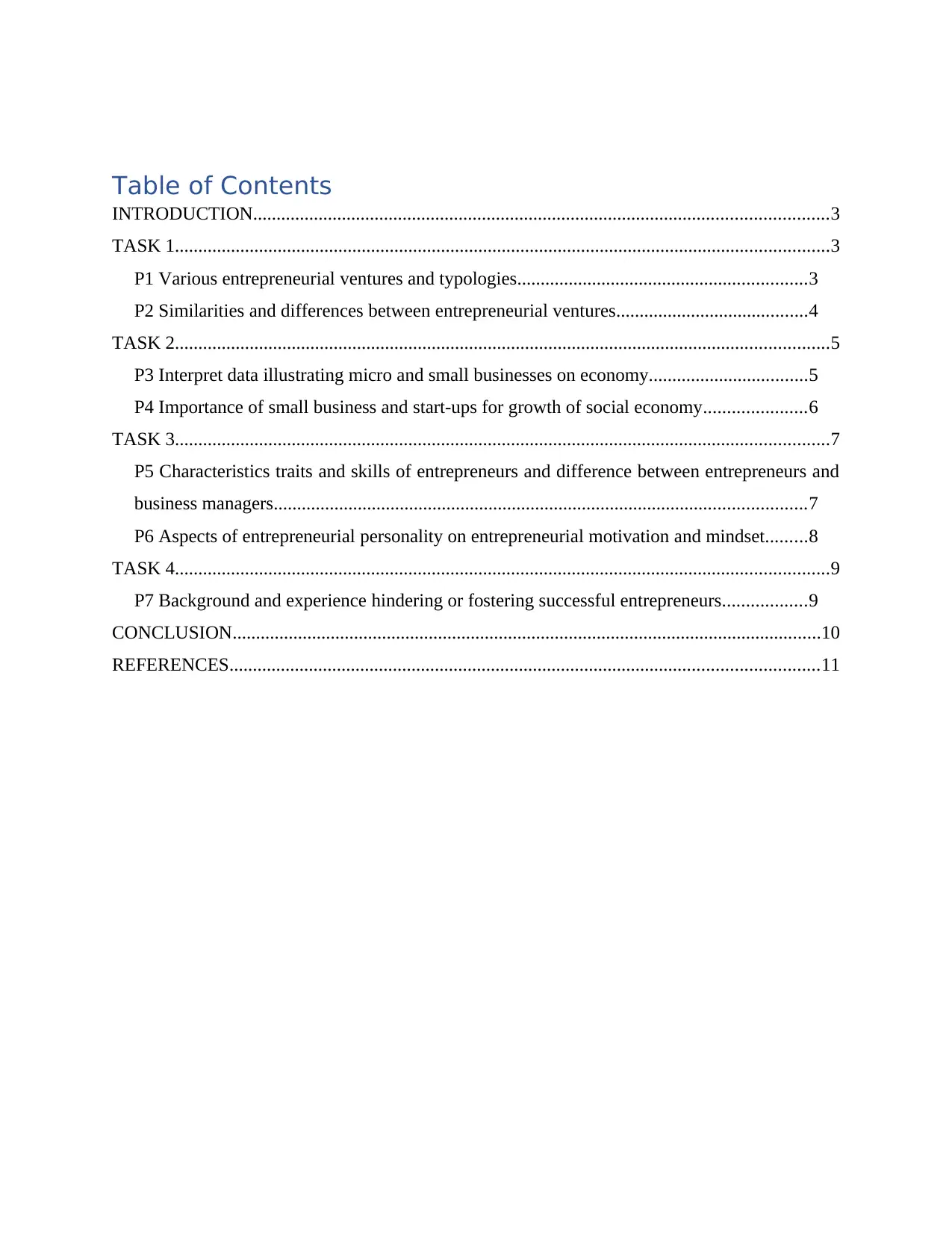
Table of Contents
INTRODUCTION...........................................................................................................................3
TASK 1............................................................................................................................................3
P1 Various entrepreneurial ventures and typologies..............................................................3
P2 Similarities and differences between entrepreneurial ventures.........................................4
TASK 2............................................................................................................................................5
P3 Interpret data illustrating micro and small businesses on economy..................................5
P4 Importance of small business and start-ups for growth of social economy......................6
TASK 3............................................................................................................................................7
P5 Characteristics traits and skills of entrepreneurs and difference between entrepreneurs and
business managers..................................................................................................................7
P6 Aspects of entrepreneurial personality on entrepreneurial motivation and mindset.........8
TASK 4............................................................................................................................................9
P7 Background and experience hindering or fostering successful entrepreneurs..................9
CONCLUSION..............................................................................................................................10
REFERENCES..............................................................................................................................11
INTRODUCTION...........................................................................................................................3
TASK 1............................................................................................................................................3
P1 Various entrepreneurial ventures and typologies..............................................................3
P2 Similarities and differences between entrepreneurial ventures.........................................4
TASK 2............................................................................................................................................5
P3 Interpret data illustrating micro and small businesses on economy..................................5
P4 Importance of small business and start-ups for growth of social economy......................6
TASK 3............................................................................................................................................7
P5 Characteristics traits and skills of entrepreneurs and difference between entrepreneurs and
business managers..................................................................................................................7
P6 Aspects of entrepreneurial personality on entrepreneurial motivation and mindset.........8
TASK 4............................................................................................................................................9
P7 Background and experience hindering or fostering successful entrepreneurs..................9
CONCLUSION..............................................................................................................................10
REFERENCES..............................................................................................................................11
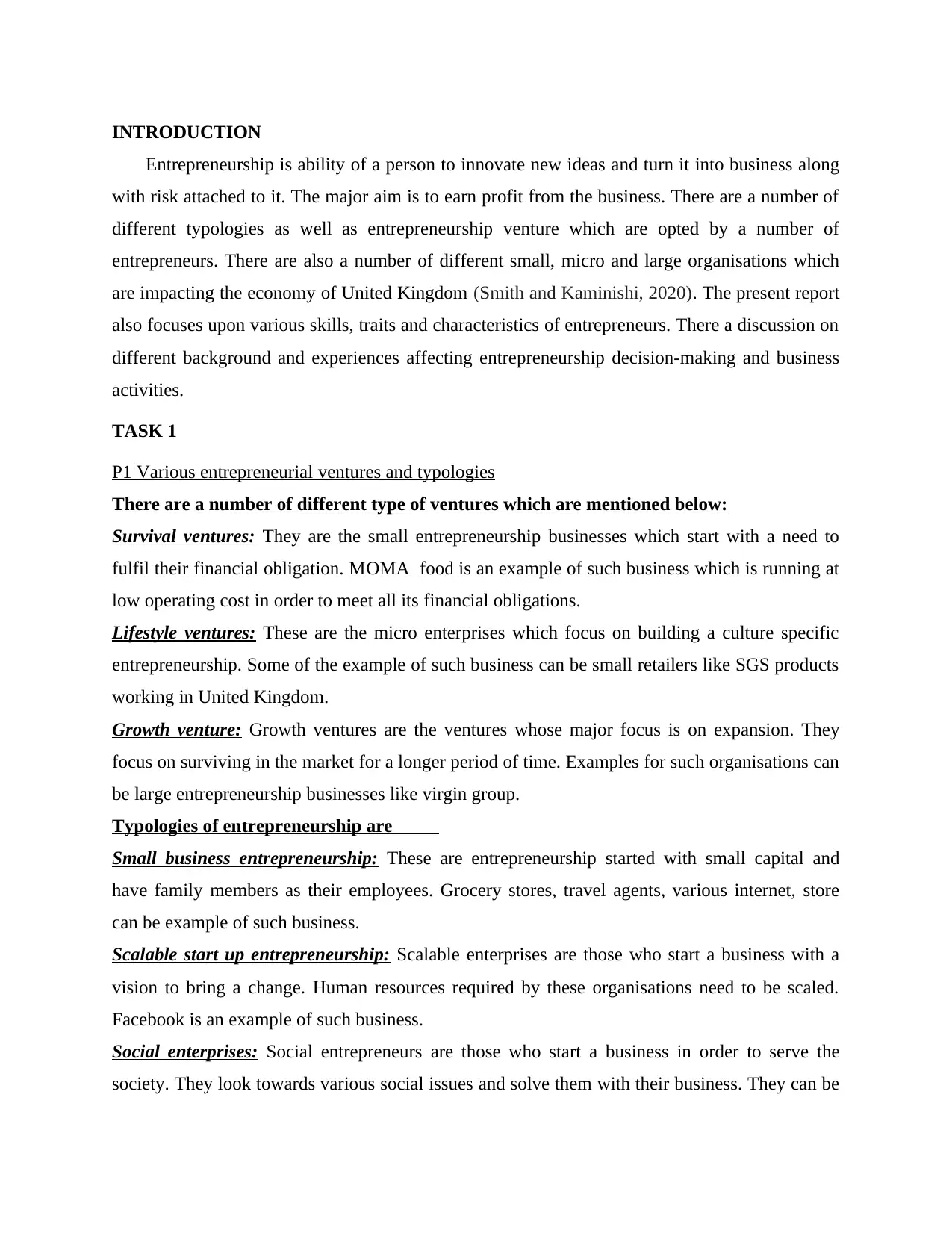
INTRODUCTION
Entrepreneurship is ability of a person to innovate new ideas and turn it into business along
with risk attached to it. The major aim is to earn profit from the business. There are a number of
different typologies as well as entrepreneurship venture which are opted by a number of
entrepreneurs. There are also a number of different small, micro and large organisations which
are impacting the economy of United Kingdom (Smith and Kaminishi, 2020). The present report
also focuses upon various skills, traits and characteristics of entrepreneurs. There a discussion on
different background and experiences affecting entrepreneurship decision-making and business
activities.
TASK 1
P1 Various entrepreneurial ventures and typologies
There are a number of different type of ventures which are mentioned below:
Survival ventures: They are the small entrepreneurship businesses which start with a need to
fulfil their financial obligation. MOMA food is an example of such business which is running at
low operating cost in order to meet all its financial obligations.
Lifestyle ventures: These are the micro enterprises which focus on building a culture specific
entrepreneurship. Some of the example of such business can be small retailers like SGS products
working in United Kingdom.
Growth venture: Growth ventures are the ventures whose major focus is on expansion. They
focus on surviving in the market for a longer period of time. Examples for such organisations can
be large entrepreneurship businesses like virgin group.
Typologies of entrepreneurship are
Small business entrepreneurship: These are entrepreneurship started with small capital and
have family members as their employees. Grocery stores, travel agents, various internet, store
can be example of such business.
Scalable start up entrepreneurship: Scalable enterprises are those who start a business with a
vision to bring a change. Human resources required by these organisations need to be scaled.
Facebook is an example of such business.
Social enterprises: Social entrepreneurs are those who start a business in order to serve the
society. They look towards various social issues and solve them with their business. They can be
Entrepreneurship is ability of a person to innovate new ideas and turn it into business along
with risk attached to it. The major aim is to earn profit from the business. There are a number of
different typologies as well as entrepreneurship venture which are opted by a number of
entrepreneurs. There are also a number of different small, micro and large organisations which
are impacting the economy of United Kingdom (Smith and Kaminishi, 2020). The present report
also focuses upon various skills, traits and characteristics of entrepreneurs. There a discussion on
different background and experiences affecting entrepreneurship decision-making and business
activities.
TASK 1
P1 Various entrepreneurial ventures and typologies
There are a number of different type of ventures which are mentioned below:
Survival ventures: They are the small entrepreneurship businesses which start with a need to
fulfil their financial obligation. MOMA food is an example of such business which is running at
low operating cost in order to meet all its financial obligations.
Lifestyle ventures: These are the micro enterprises which focus on building a culture specific
entrepreneurship. Some of the example of such business can be small retailers like SGS products
working in United Kingdom.
Growth venture: Growth ventures are the ventures whose major focus is on expansion. They
focus on surviving in the market for a longer period of time. Examples for such organisations can
be large entrepreneurship businesses like virgin group.
Typologies of entrepreneurship are
Small business entrepreneurship: These are entrepreneurship started with small capital and
have family members as their employees. Grocery stores, travel agents, various internet, store
can be example of such business.
Scalable start up entrepreneurship: Scalable enterprises are those who start a business with a
vision to bring a change. Human resources required by these organisations need to be scaled.
Facebook is an example of such business.
Social enterprises: Social entrepreneurs are those who start a business in order to serve the
society. They look towards various social issues and solve them with their business. They can be
⊘ This is a preview!⊘
Do you want full access?
Subscribe today to unlock all pages.

Trusted by 1+ million students worldwide
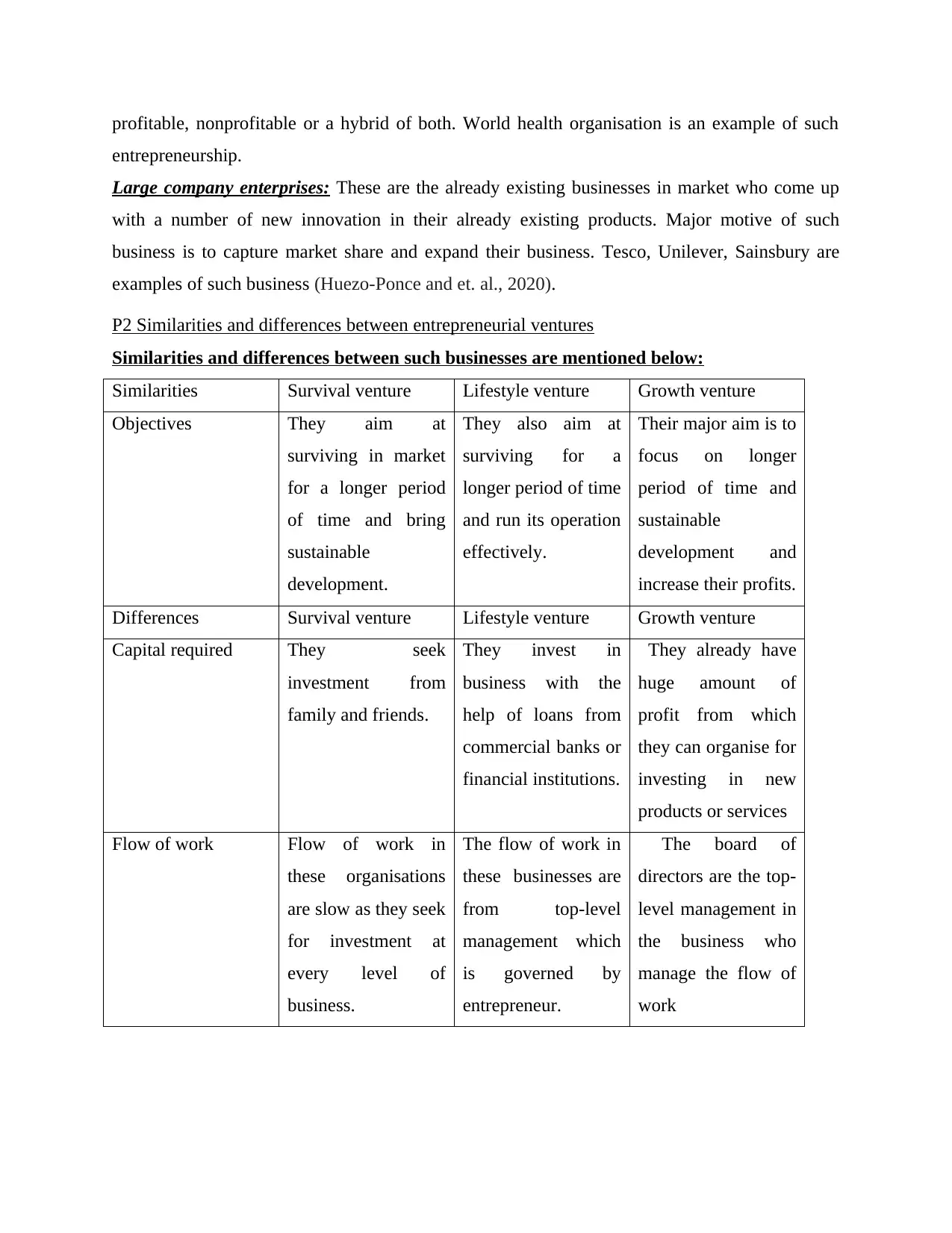
profitable, nonprofitable or a hybrid of both. World health organisation is an example of such
entrepreneurship.
Large company enterprises: These are the already existing businesses in market who come up
with a number of new innovation in their already existing products. Major motive of such
business is to capture market share and expand their business. Tesco, Unilever, Sainsbury are
examples of such business (Huezo-Ponce and et. al., 2020).
P2 Similarities and differences between entrepreneurial ventures
Similarities and differences between such businesses are mentioned below:
Similarities Survival venture Lifestyle venture Growth venture
Objectives They aim at
surviving in market
for a longer period
of time and bring
sustainable
development.
They also aim at
surviving for a
longer period of time
and run its operation
effectively.
Their major aim is to
focus on longer
period of time and
sustainable
development and
increase their profits.
Differences Survival venture Lifestyle venture Growth venture
Capital required They seek
investment from
family and friends.
They invest in
business with the
help of loans from
commercial banks or
financial institutions.
They already have
huge amount of
profit from which
they can organise for
investing in new
products or services
Flow of work Flow of work in
these organisations
are slow as they seek
for investment at
every level of
business.
The flow of work in
these businesses are
from top-level
management which
is governed by
entrepreneur.
The board of
directors are the top-
level management in
the business who
manage the flow of
work
entrepreneurship.
Large company enterprises: These are the already existing businesses in market who come up
with a number of new innovation in their already existing products. Major motive of such
business is to capture market share and expand their business. Tesco, Unilever, Sainsbury are
examples of such business (Huezo-Ponce and et. al., 2020).
P2 Similarities and differences between entrepreneurial ventures
Similarities and differences between such businesses are mentioned below:
Similarities Survival venture Lifestyle venture Growth venture
Objectives They aim at
surviving in market
for a longer period
of time and bring
sustainable
development.
They also aim at
surviving for a
longer period of time
and run its operation
effectively.
Their major aim is to
focus on longer
period of time and
sustainable
development and
increase their profits.
Differences Survival venture Lifestyle venture Growth venture
Capital required They seek
investment from
family and friends.
They invest in
business with the
help of loans from
commercial banks or
financial institutions.
They already have
huge amount of
profit from which
they can organise for
investing in new
products or services
Flow of work Flow of work in
these organisations
are slow as they seek
for investment at
every level of
business.
The flow of work in
these businesses are
from top-level
management which
is governed by
entrepreneur.
The board of
directors are the top-
level management in
the business who
manage the flow of
work
Paraphrase This Document
Need a fresh take? Get an instant paraphrase of this document with our AI Paraphraser
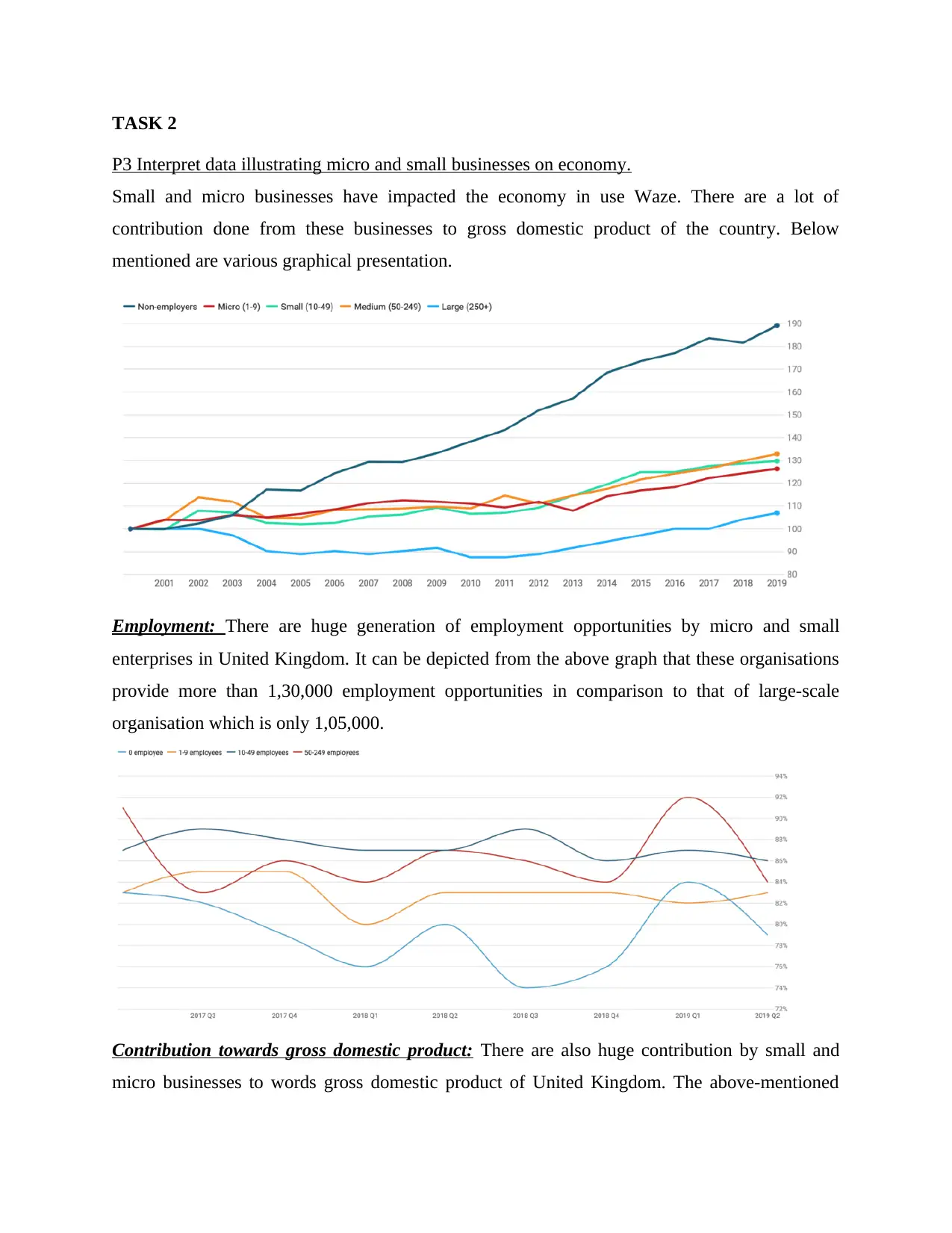
TASK 2
P3 Interpret data illustrating micro and small businesses on economy.
Small and micro businesses have impacted the economy in use Waze. There are a lot of
contribution done from these businesses to gross domestic product of the country. Below
mentioned are various graphical presentation.
Employment: There are huge generation of employment opportunities by micro and small
enterprises in United Kingdom. It can be depicted from the above graph that these organisations
provide more than 1,30,000 employment opportunities in comparison to that of large-scale
organisation which is only 1,05,000.
Contribution towards gross domestic product: There are also huge contribution by small and
micro businesses to words gross domestic product of United Kingdom. The above-mentioned
P3 Interpret data illustrating micro and small businesses on economy.
Small and micro businesses have impacted the economy in use Waze. There are a lot of
contribution done from these businesses to gross domestic product of the country. Below
mentioned are various graphical presentation.
Employment: There are huge generation of employment opportunities by micro and small
enterprises in United Kingdom. It can be depicted from the above graph that these organisations
provide more than 1,30,000 employment opportunities in comparison to that of large-scale
organisation which is only 1,05,000.
Contribution towards gross domestic product: There are also huge contribution by small and
micro businesses to words gross domestic product of United Kingdom. The above-mentioned
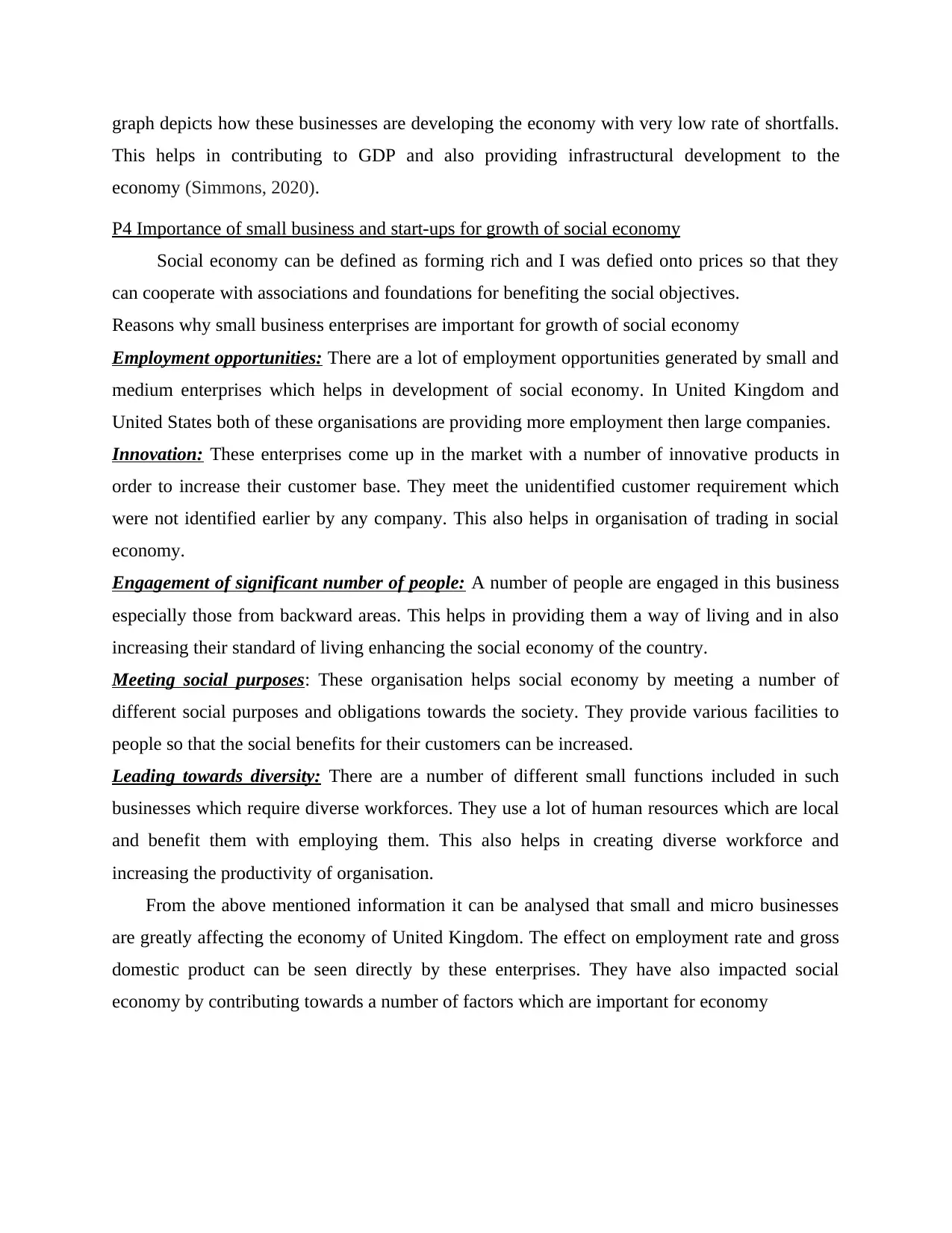
graph depicts how these businesses are developing the economy with very low rate of shortfalls.
This helps in contributing to GDP and also providing infrastructural development to the
economy (Simmons, 2020).
P4 Importance of small business and start-ups for growth of social economy
Social economy can be defined as forming rich and I was defied onto prices so that they
can cooperate with associations and foundations for benefiting the social objectives.
Reasons why small business enterprises are important for growth of social economy
Employment opportunities: There are a lot of employment opportunities generated by small and
medium enterprises which helps in development of social economy. In United Kingdom and
United States both of these organisations are providing more employment then large companies.
Innovation: These enterprises come up in the market with a number of innovative products in
order to increase their customer base. They meet the unidentified customer requirement which
were not identified earlier by any company. This also helps in organisation of trading in social
economy.
Engagement of significant number of people: A number of people are engaged in this business
especially those from backward areas. This helps in providing them a way of living and in also
increasing their standard of living enhancing the social economy of the country.
Meeting social purposes: These organisation helps social economy by meeting a number of
different social purposes and obligations towards the society. They provide various facilities to
people so that the social benefits for their customers can be increased.
Leading towards diversity: There are a number of different small functions included in such
businesses which require diverse workforces. They use a lot of human resources which are local
and benefit them with employing them. This also helps in creating diverse workforce and
increasing the productivity of organisation.
From the above mentioned information it can be analysed that small and micro businesses
are greatly affecting the economy of United Kingdom. The effect on employment rate and gross
domestic product can be seen directly by these enterprises. They have also impacted social
economy by contributing towards a number of factors which are important for economy
This helps in contributing to GDP and also providing infrastructural development to the
economy (Simmons, 2020).
P4 Importance of small business and start-ups for growth of social economy
Social economy can be defined as forming rich and I was defied onto prices so that they
can cooperate with associations and foundations for benefiting the social objectives.
Reasons why small business enterprises are important for growth of social economy
Employment opportunities: There are a lot of employment opportunities generated by small and
medium enterprises which helps in development of social economy. In United Kingdom and
United States both of these organisations are providing more employment then large companies.
Innovation: These enterprises come up in the market with a number of innovative products in
order to increase their customer base. They meet the unidentified customer requirement which
were not identified earlier by any company. This also helps in organisation of trading in social
economy.
Engagement of significant number of people: A number of people are engaged in this business
especially those from backward areas. This helps in providing them a way of living and in also
increasing their standard of living enhancing the social economy of the country.
Meeting social purposes: These organisation helps social economy by meeting a number of
different social purposes and obligations towards the society. They provide various facilities to
people so that the social benefits for their customers can be increased.
Leading towards diversity: There are a number of different small functions included in such
businesses which require diverse workforces. They use a lot of human resources which are local
and benefit them with employing them. This also helps in creating diverse workforce and
increasing the productivity of organisation.
From the above mentioned information it can be analysed that small and micro businesses
are greatly affecting the economy of United Kingdom. The effect on employment rate and gross
domestic product can be seen directly by these enterprises. They have also impacted social
economy by contributing towards a number of factors which are important for economy
⊘ This is a preview!⊘
Do you want full access?
Subscribe today to unlock all pages.

Trusted by 1+ million students worldwide
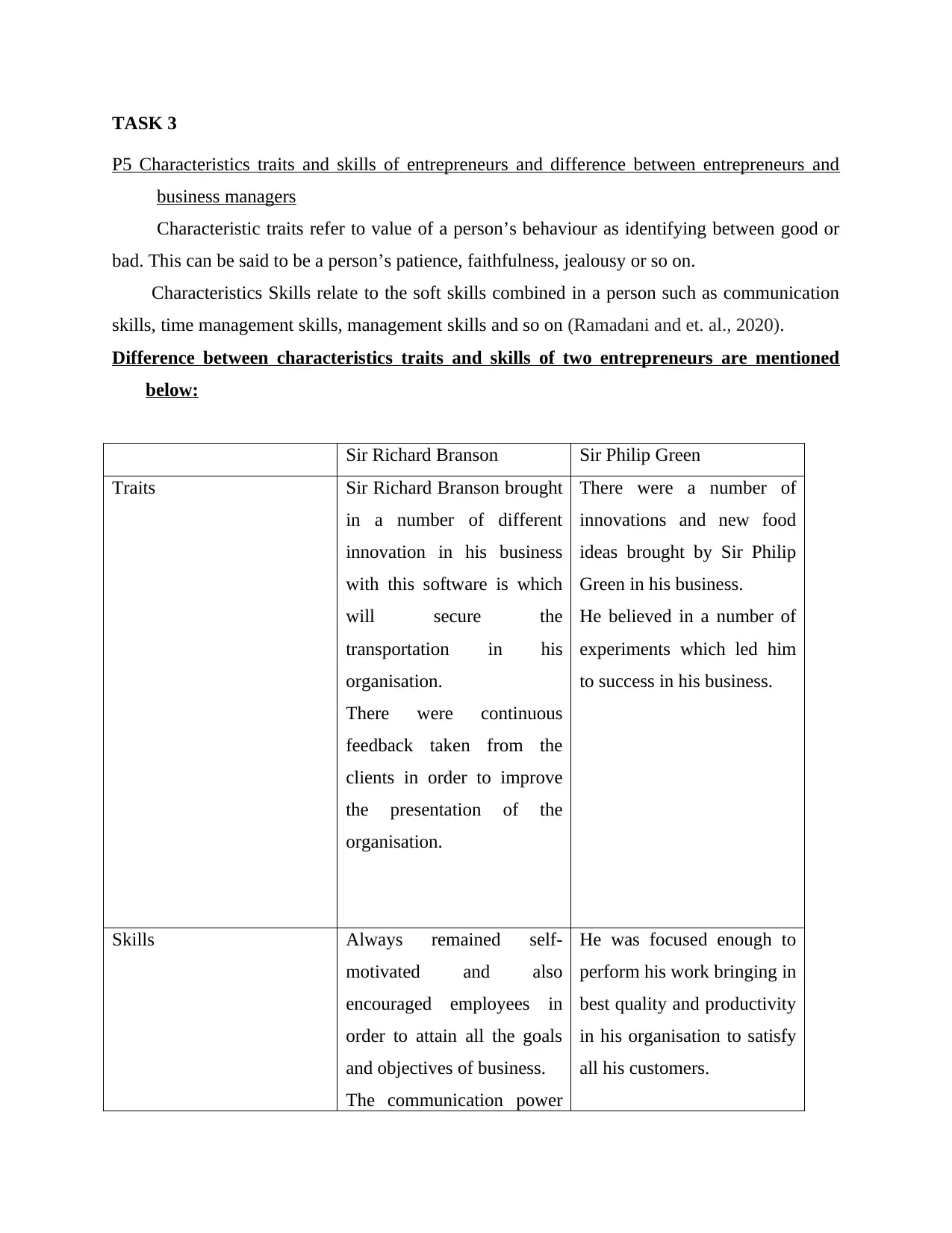
TASK 3
P5 Characteristics traits and skills of entrepreneurs and difference between entrepreneurs and
business managers
Characteristic traits refer to value of a person’s behaviour as identifying between good or
bad. This can be said to be a person’s patience, faithfulness, jealousy or so on.
Characteristics Skills relate to the soft skills combined in a person such as communication
skills, time management skills, management skills and so on (Ramadani and et. al., 2020).
Difference between characteristics traits and skills of two entrepreneurs are mentioned
below:
Sir Richard Branson Sir Philip Green
Traits Sir Richard Branson brought
in a number of different
innovation in his business
with this software is which
will secure the
transportation in his
organisation.
There were continuous
feedback taken from the
clients in order to improve
the presentation of the
organisation.
There were a number of
innovations and new food
ideas brought by Sir Philip
Green in his business.
He believed in a number of
experiments which led him
to success in his business.
Skills Always remained self-
motivated and also
encouraged employees in
order to attain all the goals
and objectives of business.
The communication power
He was focused enough to
perform his work bringing in
best quality and productivity
in his organisation to satisfy
all his customers.
P5 Characteristics traits and skills of entrepreneurs and difference between entrepreneurs and
business managers
Characteristic traits refer to value of a person’s behaviour as identifying between good or
bad. This can be said to be a person’s patience, faithfulness, jealousy or so on.
Characteristics Skills relate to the soft skills combined in a person such as communication
skills, time management skills, management skills and so on (Ramadani and et. al., 2020).
Difference between characteristics traits and skills of two entrepreneurs are mentioned
below:
Sir Richard Branson Sir Philip Green
Traits Sir Richard Branson brought
in a number of different
innovation in his business
with this software is which
will secure the
transportation in his
organisation.
There were continuous
feedback taken from the
clients in order to improve
the presentation of the
organisation.
There were a number of
innovations and new food
ideas brought by Sir Philip
Green in his business.
He believed in a number of
experiments which led him
to success in his business.
Skills Always remained self-
motivated and also
encouraged employees in
order to attain all the goals
and objectives of business.
The communication power
He was focused enough to
perform his work bringing in
best quality and productivity
in his organisation to satisfy
all his customers.
Paraphrase This Document
Need a fresh take? Get an instant paraphrase of this document with our AI Paraphraser
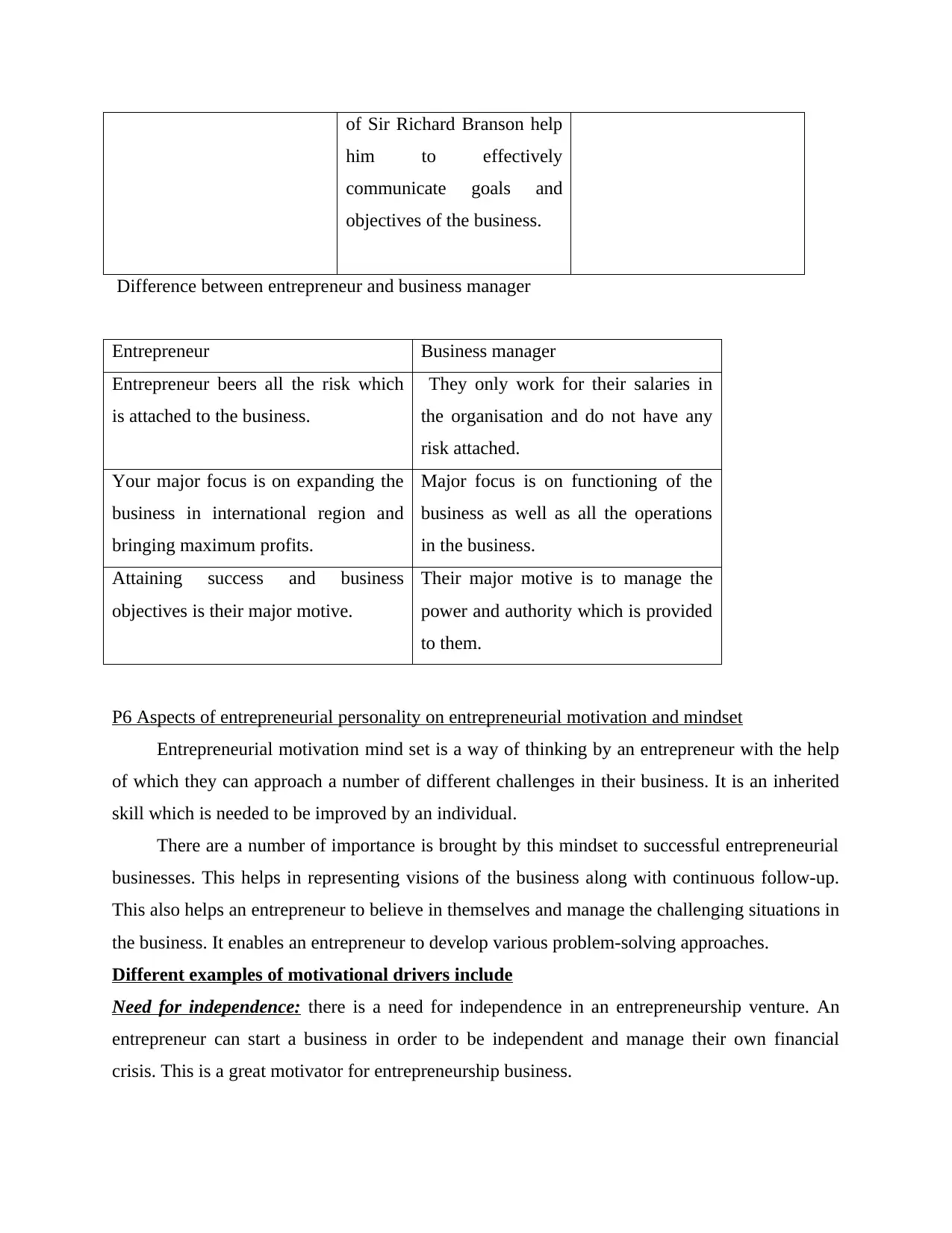
of Sir Richard Branson help
him to effectively
communicate goals and
objectives of the business.
Difference between entrepreneur and business manager
Entrepreneur Business manager
Entrepreneur beers all the risk which
is attached to the business.
They only work for their salaries in
the organisation and do not have any
risk attached.
Your major focus is on expanding the
business in international region and
bringing maximum profits.
Major focus is on functioning of the
business as well as all the operations
in the business.
Attaining success and business
objectives is their major motive.
Their major motive is to manage the
power and authority which is provided
to them.
P6 Aspects of entrepreneurial personality on entrepreneurial motivation and mindset
Entrepreneurial motivation mind set is a way of thinking by an entrepreneur with the help
of which they can approach a number of different challenges in their business. It is an inherited
skill which is needed to be improved by an individual.
There are a number of importance is brought by this mindset to successful entrepreneurial
businesses. This helps in representing visions of the business along with continuous follow-up.
This also helps an entrepreneur to believe in themselves and manage the challenging situations in
the business. It enables an entrepreneur to develop various problem-solving approaches.
Different examples of motivational drivers include
Need for independence: there is a need for independence in an entrepreneurship venture. An
entrepreneur can start a business in order to be independent and manage their own financial
crisis. This is a great motivator for entrepreneurship business.
him to effectively
communicate goals and
objectives of the business.
Difference between entrepreneur and business manager
Entrepreneur Business manager
Entrepreneur beers all the risk which
is attached to the business.
They only work for their salaries in
the organisation and do not have any
risk attached.
Your major focus is on expanding the
business in international region and
bringing maximum profits.
Major focus is on functioning of the
business as well as all the operations
in the business.
Attaining success and business
objectives is their major motive.
Their major motive is to manage the
power and authority which is provided
to them.
P6 Aspects of entrepreneurial personality on entrepreneurial motivation and mindset
Entrepreneurial motivation mind set is a way of thinking by an entrepreneur with the help
of which they can approach a number of different challenges in their business. It is an inherited
skill which is needed to be improved by an individual.
There are a number of importance is brought by this mindset to successful entrepreneurial
businesses. This helps in representing visions of the business along with continuous follow-up.
This also helps an entrepreneur to believe in themselves and manage the challenging situations in
the business. It enables an entrepreneur to develop various problem-solving approaches.
Different examples of motivational drivers include
Need for independence: there is a need for independence in an entrepreneurship venture. An
entrepreneur can start a business in order to be independent and manage their own financial
crisis. This is a great motivator for entrepreneurship business.
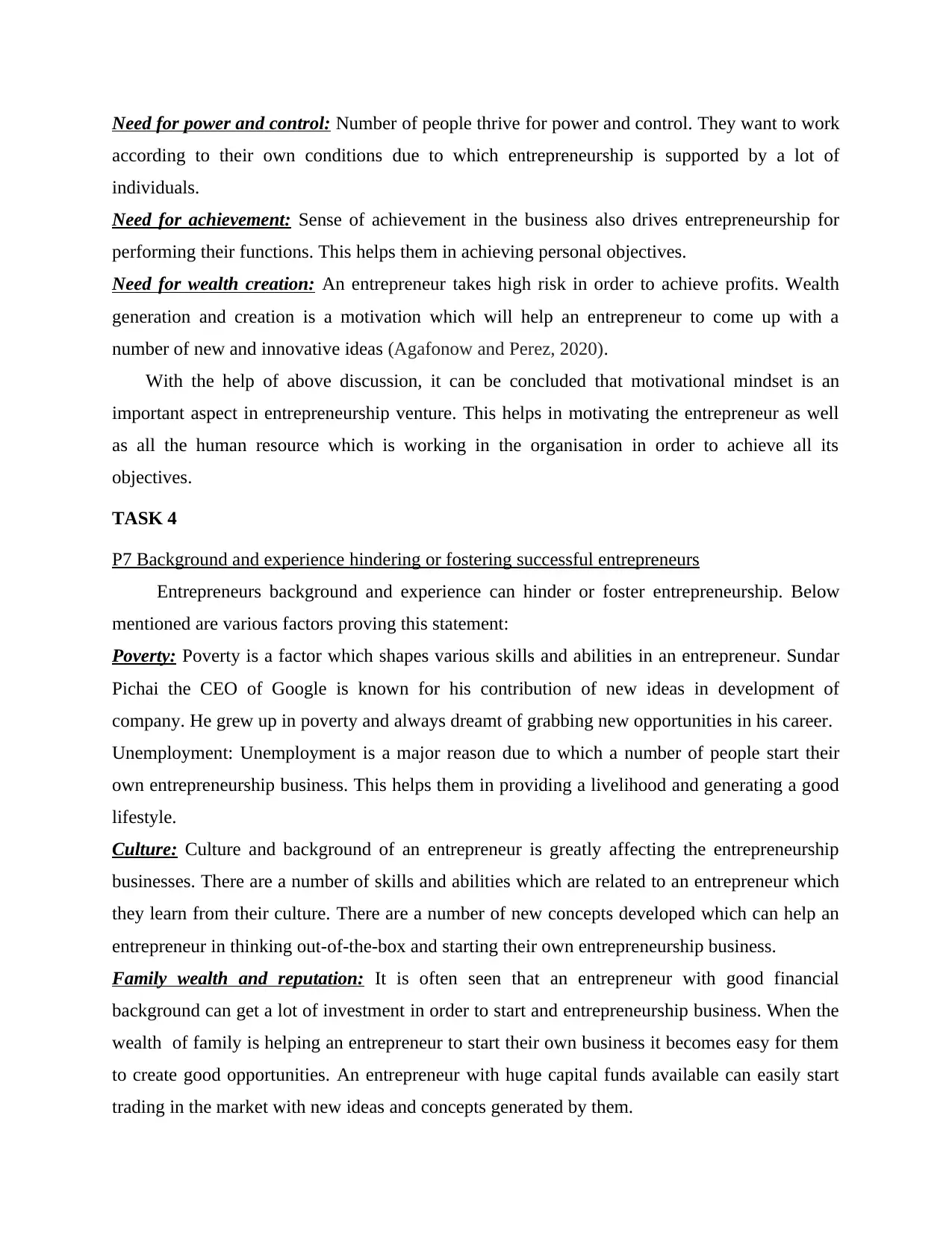
Need for power and control: Number of people thrive for power and control. They want to work
according to their own conditions due to which entrepreneurship is supported by a lot of
individuals.
Need for achievement: Sense of achievement in the business also drives entrepreneurship for
performing their functions. This helps them in achieving personal objectives.
Need for wealth creation: An entrepreneur takes high risk in order to achieve profits. Wealth
generation and creation is a motivation which will help an entrepreneur to come up with a
number of new and innovative ideas (Agafonow and Perez, 2020).
With the help of above discussion, it can be concluded that motivational mindset is an
important aspect in entrepreneurship venture. This helps in motivating the entrepreneur as well
as all the human resource which is working in the organisation in order to achieve all its
objectives.
TASK 4
P7 Background and experience hindering or fostering successful entrepreneurs
Entrepreneurs background and experience can hinder or foster entrepreneurship. Below
mentioned are various factors proving this statement:
Poverty: Poverty is a factor which shapes various skills and abilities in an entrepreneur. Sundar
Pichai the CEO of Google is known for his contribution of new ideas in development of
company. He grew up in poverty and always dreamt of grabbing new opportunities in his career.
Unemployment: Unemployment is a major reason due to which a number of people start their
own entrepreneurship business. This helps them in providing a livelihood and generating a good
lifestyle.
Culture: Culture and background of an entrepreneur is greatly affecting the entrepreneurship
businesses. There are a number of skills and abilities which are related to an entrepreneur which
they learn from their culture. There are a number of new concepts developed which can help an
entrepreneur in thinking out-of-the-box and starting their own entrepreneurship business.
Family wealth and reputation: It is often seen that an entrepreneur with good financial
background can get a lot of investment in order to start and entrepreneurship business. When the
wealth of family is helping an entrepreneur to start their own business it becomes easy for them
to create good opportunities. An entrepreneur with huge capital funds available can easily start
trading in the market with new ideas and concepts generated by them.
according to their own conditions due to which entrepreneurship is supported by a lot of
individuals.
Need for achievement: Sense of achievement in the business also drives entrepreneurship for
performing their functions. This helps them in achieving personal objectives.
Need for wealth creation: An entrepreneur takes high risk in order to achieve profits. Wealth
generation and creation is a motivation which will help an entrepreneur to come up with a
number of new and innovative ideas (Agafonow and Perez, 2020).
With the help of above discussion, it can be concluded that motivational mindset is an
important aspect in entrepreneurship venture. This helps in motivating the entrepreneur as well
as all the human resource which is working in the organisation in order to achieve all its
objectives.
TASK 4
P7 Background and experience hindering or fostering successful entrepreneurs
Entrepreneurs background and experience can hinder or foster entrepreneurship. Below
mentioned are various factors proving this statement:
Poverty: Poverty is a factor which shapes various skills and abilities in an entrepreneur. Sundar
Pichai the CEO of Google is known for his contribution of new ideas in development of
company. He grew up in poverty and always dreamt of grabbing new opportunities in his career.
Unemployment: Unemployment is a major reason due to which a number of people start their
own entrepreneurship business. This helps them in providing a livelihood and generating a good
lifestyle.
Culture: Culture and background of an entrepreneur is greatly affecting the entrepreneurship
businesses. There are a number of skills and abilities which are related to an entrepreneur which
they learn from their culture. There are a number of new concepts developed which can help an
entrepreneur in thinking out-of-the-box and starting their own entrepreneurship business.
Family wealth and reputation: It is often seen that an entrepreneur with good financial
background can get a lot of investment in order to start and entrepreneurship business. When the
wealth of family is helping an entrepreneur to start their own business it becomes easy for them
to create good opportunities. An entrepreneur with huge capital funds available can easily start
trading in the market with new ideas and concepts generated by them.
⊘ This is a preview!⊘
Do you want full access?
Subscribe today to unlock all pages.

Trusted by 1+ million students worldwide
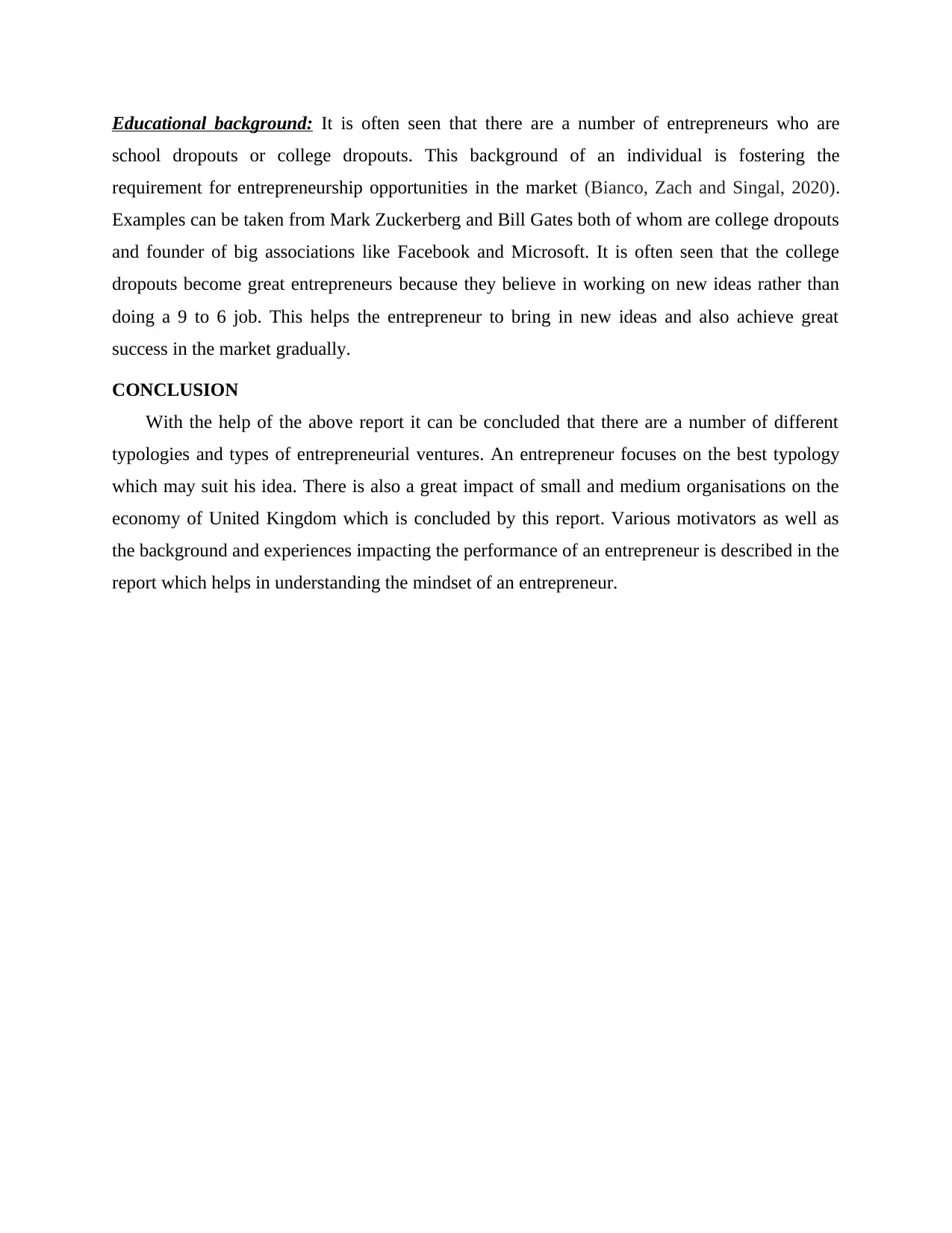
Educational background: It is often seen that there are a number of entrepreneurs who are
school dropouts or college dropouts. This background of an individual is fostering the
requirement for entrepreneurship opportunities in the market (Bianco, Zach and Singal, 2020).
Examples can be taken from Mark Zuckerberg and Bill Gates both of whom are college dropouts
and founder of big associations like Facebook and Microsoft. It is often seen that the college
dropouts become great entrepreneurs because they believe in working on new ideas rather than
doing a 9 to 6 job. This helps the entrepreneur to bring in new ideas and also achieve great
success in the market gradually.
CONCLUSION
With the help of the above report it can be concluded that there are a number of different
typologies and types of entrepreneurial ventures. An entrepreneur focuses on the best typology
which may suit his idea. There is also a great impact of small and medium organisations on the
economy of United Kingdom which is concluded by this report. Various motivators as well as
the background and experiences impacting the performance of an entrepreneur is described in the
report which helps in understanding the mindset of an entrepreneur.
school dropouts or college dropouts. This background of an individual is fostering the
requirement for entrepreneurship opportunities in the market (Bianco, Zach and Singal, 2020).
Examples can be taken from Mark Zuckerberg and Bill Gates both of whom are college dropouts
and founder of big associations like Facebook and Microsoft. It is often seen that the college
dropouts become great entrepreneurs because they believe in working on new ideas rather than
doing a 9 to 6 job. This helps the entrepreneur to bring in new ideas and also achieve great
success in the market gradually.
CONCLUSION
With the help of the above report it can be concluded that there are a number of different
typologies and types of entrepreneurial ventures. An entrepreneur focuses on the best typology
which may suit his idea. There is also a great impact of small and medium organisations on the
economy of United Kingdom which is concluded by this report. Various motivators as well as
the background and experiences impacting the performance of an entrepreneur is described in the
report which helps in understanding the mindset of an entrepreneur.
Paraphrase This Document
Need a fresh take? Get an instant paraphrase of this document with our AI Paraphraser
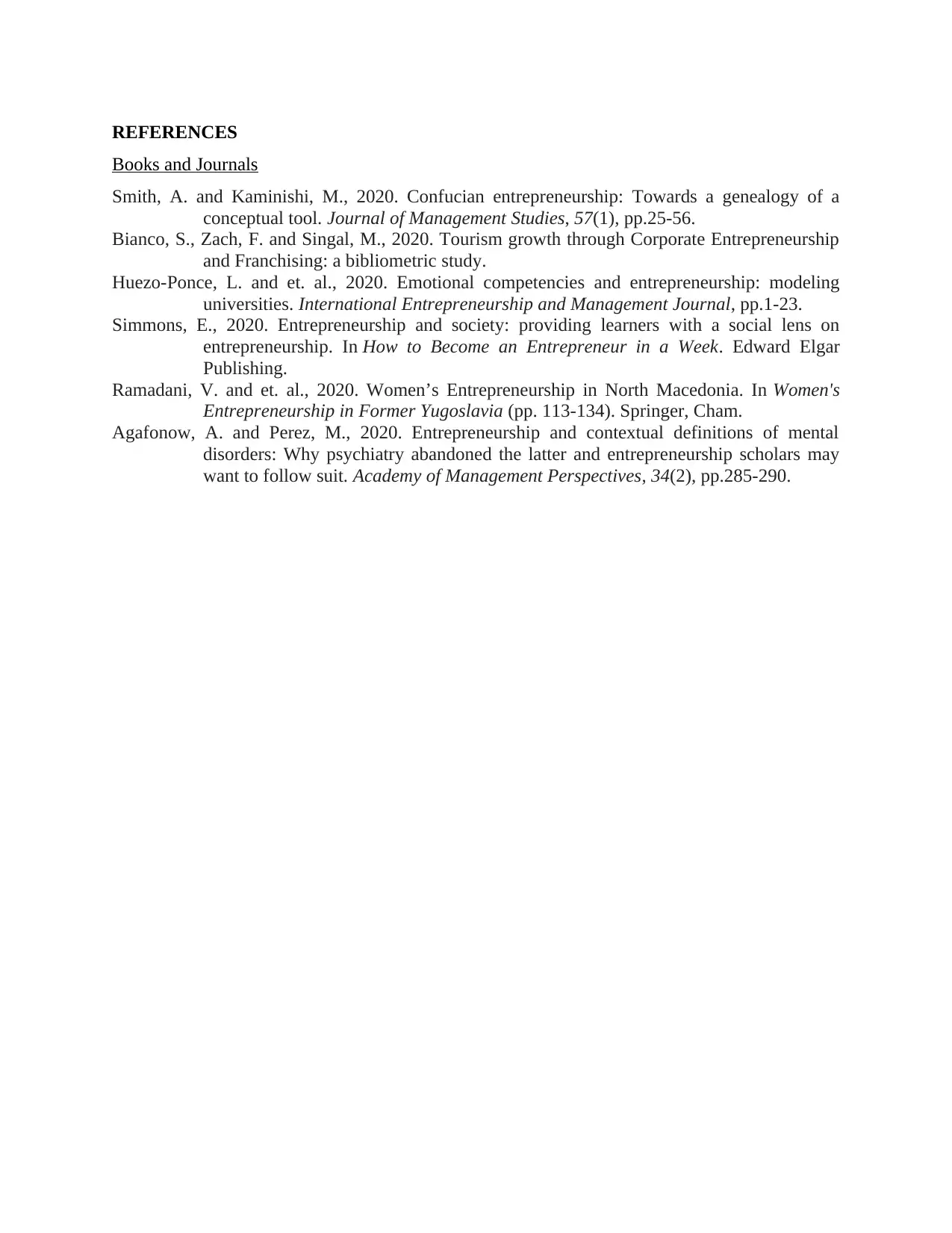
REFERENCES
Books and Journals
Smith, A. and Kaminishi, M., 2020. Confucian entrepreneurship: Towards a genealogy of a
conceptual tool. Journal of Management Studies, 57(1), pp.25-56.
Bianco, S., Zach, F. and Singal, M., 2020. Tourism growth through Corporate Entrepreneurship
and Franchising: a bibliometric study.
Huezo-Ponce, L. and et. al., 2020. Emotional competencies and entrepreneurship: modeling
universities. International Entrepreneurship and Management Journal, pp.1-23.
Simmons, E., 2020. Entrepreneurship and society: providing learners with a social lens on
entrepreneurship. In How to Become an Entrepreneur in a Week. Edward Elgar
Publishing.
Ramadani, V. and et. al., 2020. Women’s Entrepreneurship in North Macedonia. In Women's
Entrepreneurship in Former Yugoslavia (pp. 113-134). Springer, Cham.
Agafonow, A. and Perez, M., 2020. Entrepreneurship and contextual definitions of mental
disorders: Why psychiatry abandoned the latter and entrepreneurship scholars may
want to follow suit. Academy of Management Perspectives, 34(2), pp.285-290.
Books and Journals
Smith, A. and Kaminishi, M., 2020. Confucian entrepreneurship: Towards a genealogy of a
conceptual tool. Journal of Management Studies, 57(1), pp.25-56.
Bianco, S., Zach, F. and Singal, M., 2020. Tourism growth through Corporate Entrepreneurship
and Franchising: a bibliometric study.
Huezo-Ponce, L. and et. al., 2020. Emotional competencies and entrepreneurship: modeling
universities. International Entrepreneurship and Management Journal, pp.1-23.
Simmons, E., 2020. Entrepreneurship and society: providing learners with a social lens on
entrepreneurship. In How to Become an Entrepreneur in a Week. Edward Elgar
Publishing.
Ramadani, V. and et. al., 2020. Women’s Entrepreneurship in North Macedonia. In Women's
Entrepreneurship in Former Yugoslavia (pp. 113-134). Springer, Cham.
Agafonow, A. and Perez, M., 2020. Entrepreneurship and contextual definitions of mental
disorders: Why psychiatry abandoned the latter and entrepreneurship scholars may
want to follow suit. Academy of Management Perspectives, 34(2), pp.285-290.
1 out of 11
Related Documents
Your All-in-One AI-Powered Toolkit for Academic Success.
+13062052269
info@desklib.com
Available 24*7 on WhatsApp / Email
![[object Object]](/_next/static/media/star-bottom.7253800d.svg)
Unlock your academic potential
Copyright © 2020–2026 A2Z Services. All Rights Reserved. Developed and managed by ZUCOL.





